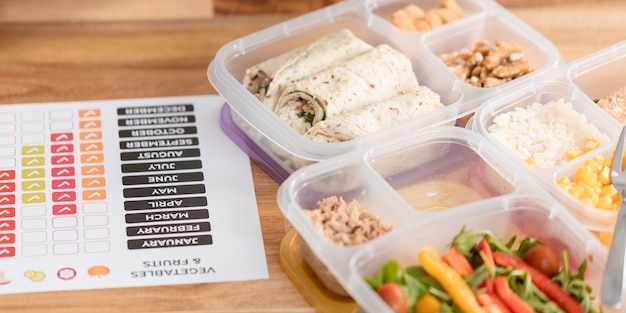The Hormone-Balancing Weekly Meal Prep Guide: Science-Backed Plan with Action Steps & Progress Trackers
Hormonal imbalances can affect energy, mood, weight, sleep, and overall well-being. While lifestyle factors like stress and sleep play a role, nutrition is a powerful lever for hormone regulation. Weekly meal prep offers a practical, evidence-based way to support hormonal health by ensuring consistent intake of key nutrients. This comprehensive guide provides a clear blueprint, actionable steps, progress checks, and solutions to common challenges.
Why Meal Prep Matters for Hormone Balance
Hormones like insulin, cortisol, estrogen, progesterone, and thyroid hormones respond directly to what and when we eat. Unpredictable eating patterns, processed foods, and nutrient deficiencies can disrupt these delicate systems. Meal prepping helps by:
- Stabilizing blood sugar and insulin levels
- Supporting liver detoxification of excess hormones
- Providing essential fats for hormone synthesis
- Reducing inflammation linked to hormonal disorders
- Minimizing stress-related eating and decision fatigue

The Hormone-Friendly Plate: What to Include
Each meal should aim to balance macronutrients and include key micronutrients. Follow this plate model:
50% Non-Starchy Vegetables: Cruciferous veggies (broccoli, kale, cauliflower) support estrogen metabolism. Leafy greens provide magnesium, which helps regulate cortisol.
25% Lean Protein: Fish, poultry, legumes, and tofu supply amino acids needed for hormone production.
25% Complex Carbohydrates: Sweet potatoes, quinoa, and oats offer fiber to stabilize blood sugar and support gut health, which influences hormone balance.
Healthy Fats: Avocado, olive oil, nuts, and seeds (especially flax and chia) provide cholesterol—the building block of all steroid hormones.
Weekly Meal Prep Blueprint
Follow this 5-step process every week:
- Plan (Sunday): Choose 3–4 balanced recipes. Focus on variety: include different proteins, colors of vegetables, and whole grains.
- Shop: Stick to the perimeter of the store—produce, proteins, dairy, and bulk bins for nuts and seeds.
- Prep in Batches: Roast vegetables, cook grains, grill proteins, and make dressings ahead. Store in portioned containers.
- Assemble Meals: Combine components into ready-to-eat meals. Add fresh herbs or lemon juice before eating to boost flavor and nutrient absorption.
- Rotate Smartly: Repurpose leftovers—turn grilled chicken into a salad or stir-fry to maintain interest.

Key Nutrients and Their Hormonal Roles
Target these nutrients in your weekly prep:
- Fiber (25–35g/day): Helps eliminate excess estrogen via the gut. Include flaxseeds, berries, and legumes.
- Omega-3 Fatty Acids: Reduce inflammation and support cell membrane health. Use fatty fish or algae oil.
- Magnesium: Supports adrenal function and sleep. Found in spinach, pumpkin seeds, and dark chocolate (in moderation).
- Zinc: Vital for thyroid and reproductive hormones. Sources: shellfish, lentils, and cashews.
- Probiotics: Gut microbiome influences estrogen recycling. Include fermented foods like sauerkraut or unsweetened yogurt.
Actionable Steps & Weekly Progress Checks
Track your progress with these weekly actions:
| Action Step |
Progress Check |
| Prep 3–5 balanced meals |
✓ Completed? Note energy levels |
| Include cruciferous vegetables daily |
✓ Logged in food journal? |
| Consume omega-3s 3x/week |
✓ Added to meal plan? |
| Limit added sugars and processed foods |
✓ Avoided? Note cravings |
Common Challenges & Solutions
- Lack of Time: Start small—prep just 2–3 meals. Use frozen vegetables and pre-cooked grains.
- Boredom: Rotate spices and sauces—try turmeric, cumin, or tahini-based dressings.
- Cost: Buy seasonal produce, bulk grains, and frozen proteins. Plan meals around sales.
- Storage: Use glass containers to preserve freshness and avoid plastic leaching.
Supportive Programs & Tools
Consider using:
- Meal planning apps with hormone-friendly filters
- Printable weekly trackers for food and symptoms
- Online communities focused on hormonal health through nutrition
- Registered dietitians specializing in functional or integrative nutrition
Consistency is key. Over 4–6 weeks, many notice improved energy, better sleep, reduced bloating, and more regular cycles. Always consult a healthcare provider if symptoms persist, as hormonal issues may require medical evaluation.
By making weekly meal prep a ritual, you’re not just saving time—you’re investing in long-term hormonal harmony.

















